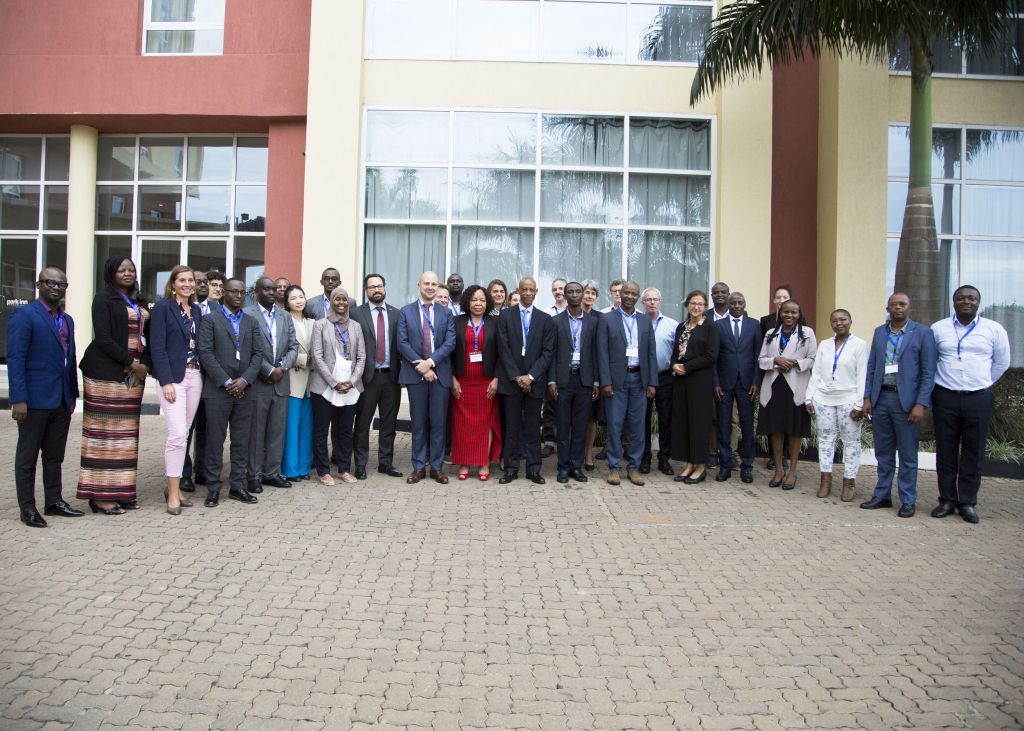On 31 August and 1 September 2022, representatives of East African Regulatory Authorities and the pharmaceutical sector as well as members of the Team Europe Initiative MAV+ met in Kigali, Rwanda, to exchange experiences and discuss potential areas of collaboration in the East African Community region (EAC) and beyond. The aim was to strengthen pharmaceutical regulation as a prerequisite for an economically sustainable local vaccine production in the region.
The two-day workshop was organised by Germany within the context of the Team Europe Initiative on Manufacturing and Access to Vaccines, Medicines and Health Technologies (TEI MAV+) in Africa and in close collaboration with the European Commission, the EAC and the African Union Development Agency (AUDA-NEPAD). It brought together key players from African and European regulatory authorities, WHO, Africa CDC, the public and the private sector as well as different donor agencies. The workshop, attended by more than 80 persons in Kigali and online, addressed the needs for enhancing pharmaceutical regulation and its harmonisation for the newly emerging local vaccine manufacturing in the East African Region.
In his opening statement, Dr. Emile Bienvenu, Director General of the Rwanda Food and Drug Authority, emphasised the opportunities for cooperation: “Starting production of pharmaceutical products requires having sound regulatory systems in place to ensure products of high quality. […] It becomes clear that most countries face similar challenges in establishing the required level of regulation. However, we can turn this into a chance as it opens room for a collaborative approach rather than working in isolation.”
Dr. Margareth Ndomondo-Sigonda, Head of the African Medicines Regulatory Harmonization (AMRH) initiative at AUDA NEPAD, also highlighted the importance of harmonised standards and guidelines to work towards mutual reliance on regulatory decision at national level. She emphasised that it was the “commitment to cooperate between different agencies that was key to move forward towards a harmonised approach.”
Jürgen Kretz, the representative of the German Federal Ministry for Economic Cooperation and Development, emphasized that Germany supports the strengthening of framework conditions for vaccine production on the African continent since 2021. So far, the German government has committed more than 530 million euro in this context. The German engagement is embedded in the Team Europe Initiative. Germany has also made the important issue of local and regional vaccine production a priority of this year's G7 presidency.
WHO introduced the international regulatory requirements for development and production of vaccines, followed by National Regulatory Authorities (NRAs) and the private sector presenting their needs from an implementer's perspective, while TEI MAV+ members: the EU delegation in Rwanda, Germany, France and Belgium, shared concrete examples of their current support and opportunities for the future. Building on existing platforms and initiatives such as the African Medicines Regulatory Harmonization (AMRH) initiative and the Coalition of Interested Partners under WHO will be key to advancing fast and respect African ownership of the process.
While regulation of vaccines is a new field in the region, regulatory expertise is readily available, particularly in the form of collaborative processes. According to Regina Lehnert, Clinical Assessor and Project Lead from the German Federal Institute for Drugs and Medical Devices, “mapping and matching” strengths and challenges of different partners, using the expertise in a peer-to-peer learning approach between NRAs, but also from Africa and Europe in a twinning approach, will be the most efficient and effective approach towards enhancing institutional and individual capacity for the different regulatory functions. “It creates the opportunity for mutual learning”
Representatives of NRAs from Rwanda, Tanzania, Kenya, Uganda, and Ghana, as guest from ECOWAS, exchanged experiences on their way to reaching regulatory maturity levels compliant with international standards. Sound regulatory capacity for vaccine development, production and release is a prerequisite to ensure effectiveness and safety of vaccines as well as competitiveness around the world.
Germany is a member of the Team Europe initiative MAV+ which aims at improving the supply and demand of health products,and induce the right ecosystem. One of its pillars is regulatory strengthening. The Deutsche Gesellschaft für Internationale Zusammenarbeit (GIZ) GmbH on behalf of the German Federal Ministry for Economic Cooperation and Development (BMZ) supports the implementation of the initiative: Among others, the global project “BACKUP Health” aims to improve the framework conditions for local vaccine production in Africa. Furthermore, in the context of Germany´s “Special Initiative on Training and Job Creation” support is offered to strengthen Rwanda’s ecosystem of the pharmaceutical and biotechnological sector with the long-term objective of creating jobs in the country.
Currently, several new vaccine production facilities are being planned in the EAC region, such as in Kenya, Rwanda and Tanzania. Moreover, Rwanda will host the African Medicines Agency (AMA) intended to facilitate the harmonisation of health product regulation throughout the African Union.
The Team Europe Initiative (TEI) MAV+
The Team Europe initiative (TEI) on Manufacturing and Access to Vaccines, Medicines and Health Technologies (MAV+), adopted by the EU in October 2021, aims at boosting local manufacturing capacities in Africa. The overall objective of MAV+ is to increase equitable access to safe, effective, quality and affordable essential vaccines, medicines and health technologies for all Africans. This objective promotes ultimately universal health coverage (UHC). The TEI provides comprehensive support at continental, regional and national level to promote the supply and demand side as well as the enabling environment for local production of health products and technologies in Africa.
For more information, contact Christina Heese (christina.heese@giz.de).
